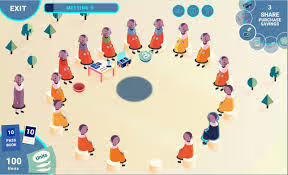Grants Database
Building on the positive feedback from the landscape and feasibility assessment, Global Communities will create a vendor neutral Digital Savings Group Toolkit Project (DSG Toolkit), which will have the goal of gathering lessons learned from across the industry to be shared widely across the sector. The DSG Toolkit is envisioned as a living resource that will remain active, relevant, and regularly add new content. The overall goal is to help actors in the community to make the digital transformation successful by learning from successes and failures in the sector.
The creation of an easy-to-use website to serve as a resource portal with content for organizations considering digital savings groups. This site will include tools for practitioners (learning briefs, howto-guides, videos, and case studies), blogs, and the ability to send automated alerts for users who sign up for them.
On behalf of FAHU, in Q1, 2021, GLOBAL COMMUNITIES conducted a "landscape and feasibility assessment" showing that there is a great demand among actors in the savings group community for information and tools regarding digital savings groups. The assessment also showed an impressive willingness among actors to share learnings, tools, and best practices in order for the community to benefit from them.
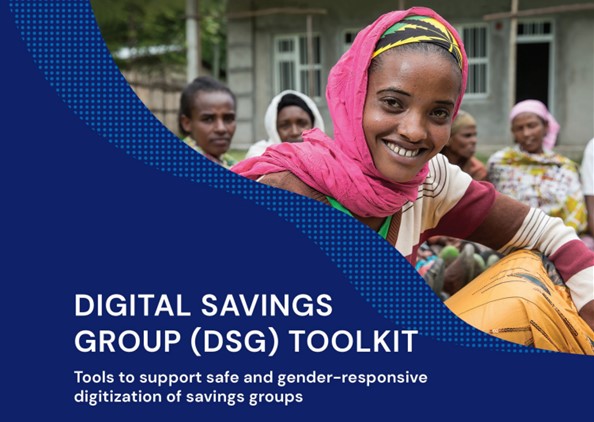

Digital Savings Group Toolkit - Phase 1
The purpose of this third phase is to establish and validate procedures/guidelines for the use of the VSLA simulation game app thereby establishing proven impact ofthe app by documenting the outcomes when the app is utilized.
- Generic procedures/guidelines for the use of the VSLA Simulation Game App in a local organization/NGO/country office implementing VSLA.
- Evidence of the impact of the use of the VSIA Simulation Game App compared to implementing VSIA without the app.
- Assuming the project demonstrates evidence of positive effects the results shall be disseminated through: o Presentation of the procedures/guidelines and findings at SEEP 5G conference in 2022 and SEEP network in general, DCA internal channels, DCA partnership channels, ACT Learn, Fabo lnitiative, danish Forum for Microfinans
This project strives to develop proven procedures for the use of the app by:
- Developing procedures in a regional partnership.
- Evaluating these over a full VSLA cycle.
- Adjusting the procedures based on the learnings.
.jpg)

VSLA E-Learning App Phase 3
The main objective of the pilot project is to bring financial services to some of the most disadvantaged communities of mainly women in Niger by developing a digital, blockchain-based platform for VSLA groups in Niger. The platform will build reputation and credit history, enable them to transact safely and securely, give them access to credit they can't get today, and open out new markets.
- A formal reputation and credit history for VSLA members
- Access to credit to grow businesses
- Cashless transfers to reduce the risk and cost of lending
- Traceable money to remove corruption
- Access to new markets
- Accrued wealth in communities
- Peer to peer transactions enabled
- New marketplaces created
- Android, feature phone and tablet ecosystem established
Nigerien people have extremely low levels of access to formal banking and internet penetration below 1%. Mobile phone penetration has increased dramatically in recent years but remains below 50%, with low levels of coverage beyond population centres. There is a high physical risk of moving money around and armed guards needed, which is why microfinance lenders can't reach communities because of the high cost.
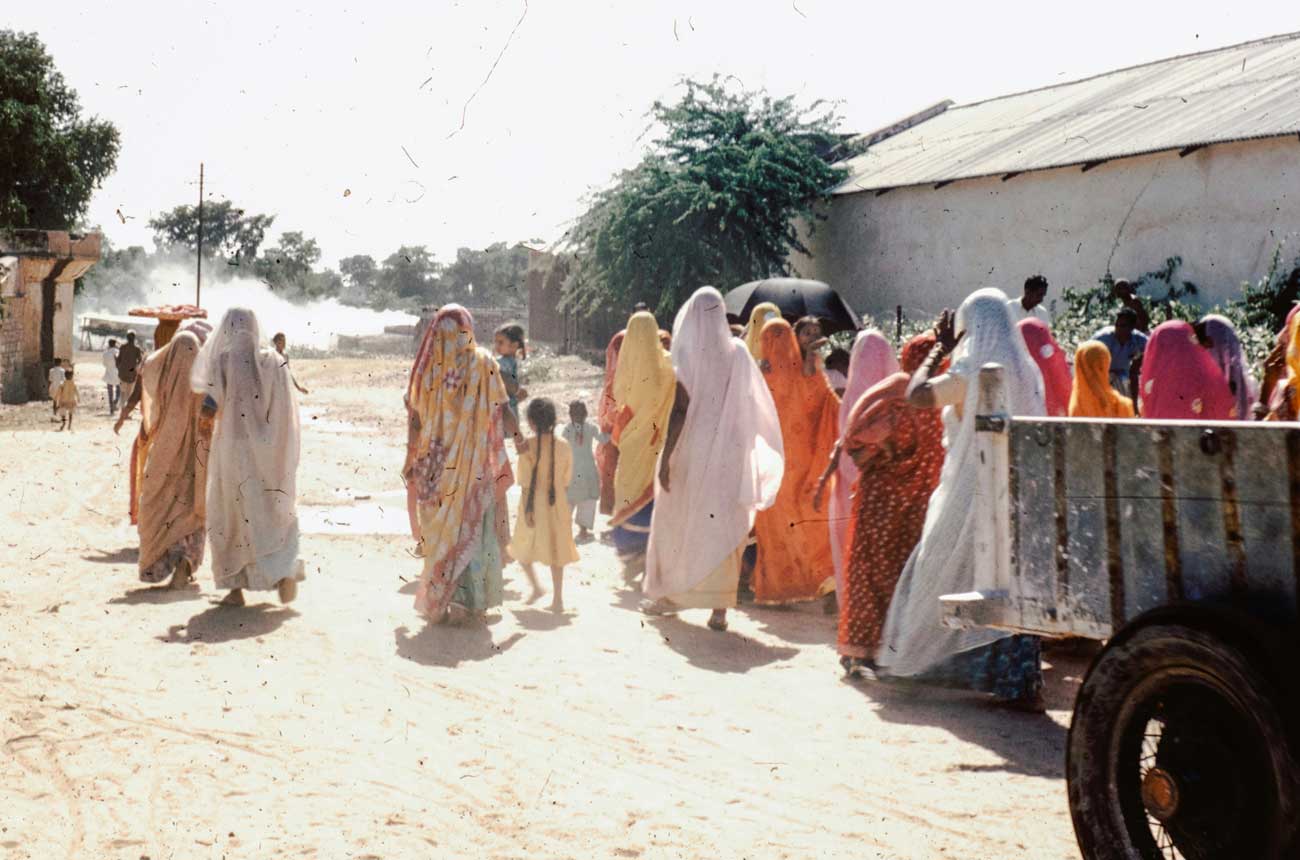

BlockSaver - Digitisation of VSLAs in Niger
Three research briefs that highlight key insights from a study of Digital Savings Groups conducted in rural Tanzania from August 2019 through February 2020. The study followed two sets of WE savings groups that used the DreamSave app from DreamStart Labs.
Data collection tools developed, tested and refined, Anticipated NBS Approval, Community and group sensitization, New group formation - 8 'born digital' groups by Community Facilitators, Baseline data collection, Training, support and observation of groups, Reflection meetings with Community Facilitators, Focus group discussions & in-depth interviews,
The research was conducted by the International Center for Research on Women (ICRW) working with savings groups supported by PCI, a Global Communities Partner, and their Women Empowered (WE) program.
.avif)

Changing the Game with Savings Groups that are 'Born Digital'
Improved graphics and workability of the SAVIX MIS database
Improved graphics and workability of the SAVIX MIS database
Savings Groups Information Exchange (SAVIX) is a unique reporting system that provides transparent and standardized data on savings groups (www.thesavix.org).
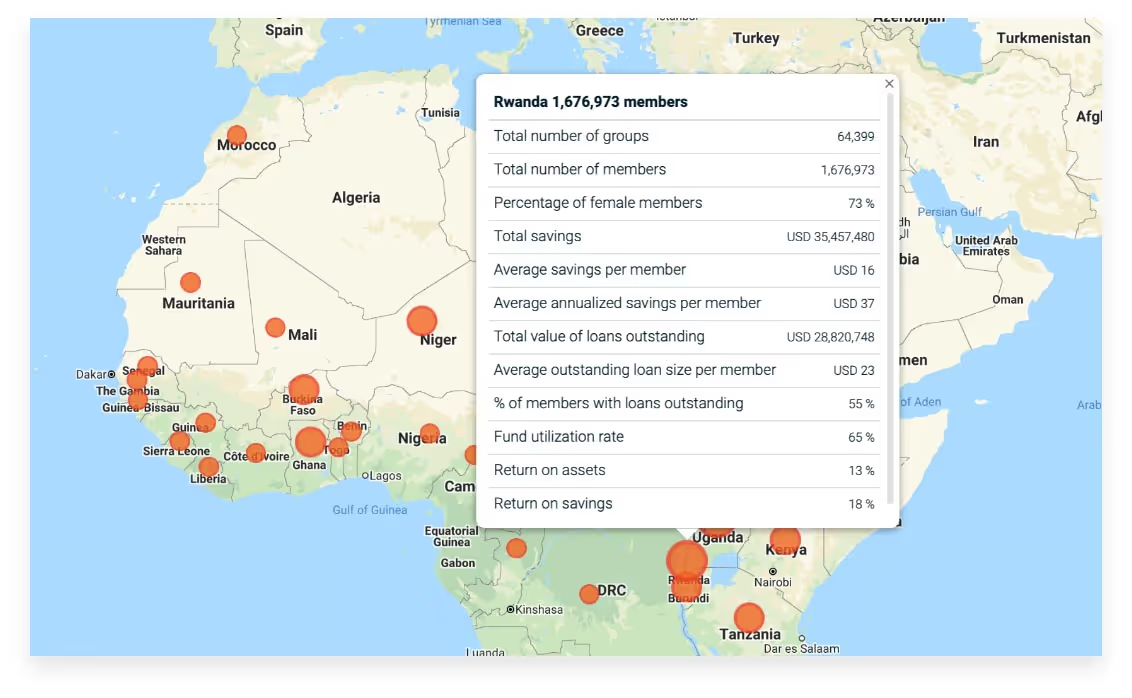

Support to SAVIX MIS database
Utilizing the tools of the SAVIX to collect and compare data, this project aims at empowering savings groups to improve performance significantly, and in collaboration with Danish facilitating organisations construct a credible performance database of savings groups, that can further spur investment in the sector.
- AWARENESS FOR FACILITATING ORGANISATIONS
The network is established with minimum 7 organisations - CREATION OF THE KNOWLEDGE NETWORK
MIS created within the SAVIX including Network specific indicators - DATA COLLECTED
Data collected and entered into the SAVIX on a minimum of 30.000 people - IMPROVED PERFORMANCE
Performance plans are well received as a tool for improvement of practises and improved performance of all participating savings groups following the first year of the project implementation - RESEARCH AND ADVOCACY
Research findings are published and handed out to DFM members and the public - PROJECT HANDOVER
Evaluation of project
Through increasingly rigorous monitoring and evaluation systems, Danish organisations working with VSLA groups, can make greater efforts to better understand the performance, dynamics and survival rate of independent groups. This will is fundamental for assessing the efficiency of working VSLA groups, and as a basis for action plans striving towards better performance of all actors involved.
.avif)

SAVIX Danish Learning Community
Identifying micro and macro-economic determinants of success of savings groups: a global analysis using the SAVIX through the Ph.D. project of Rolando Gonzales, with professor Roy Mersland who presented the analysis at the E-MFP conference in Luxenburg.
The studies analyze which 'delivery model' enhances group-performance and thereby seems most effective for development purposes. This will shed light on an 'optimal' level of involvement and an optimal governance structure and will produce insight for development actors who are looking for the most effective model to promote savings group and deliver development services.
Savings Groups Information Exchange (SAVIX) is a unique reporting system that provides transparent and standardized data on more than 250,000 savings groups in 43 countries globally (www.thesavix.org).


Ph.D. VSLA Research Project based on the SAVIX Global VSLA database
Midline and endline surveys of RCT will be conducted and the resulting data compiled and analyzed. The data is expected to provide measurable outcomes that will show whether savings groups participants benefit from access to external bank credit. Researcher shall pbulish the results and SEEP will dissiminate research outcomes.
The purpose of the second phase is to provide funding for midline and endline surveys. Those studies will create data to test the working hypothesis that members of savings groups that are linked to bank loans borrow and invest at a higher rate, thus foster micro-enterprise and hoosting household income. An overall qualitative analysis of the various effects linkages have on savings groups will be the sjbject of the research team of Jessica Goldberg and Alfredo Burlando.
During the first phase of the bank linkage project, FAHU provided funding for field-based costs related to the PhD study in the effects financial linkages have on Savings Groups. In spring 2015, a baselind study was conducted and a randomized controlled Trial (RCT) was implemented through Dec 2016.
.avif)

Ph.D. VSLA Linkage Project Phase 2
The purpose of the second phase of the VSLA Training is to ensure extensive piloting with key stakeholders, further development of the app (for general improvement as well as including new features), and a broader and more thorough dissemination of the training to Civil Society Organisations (CSOs) working with Saving Groups in the global South. This will be done by engaging the organisations in the piloting of the VSLA training version 1.0, co-finance/finance translations, as well as providing free access to the training through well-known and acknowledged VSLA platforms.
- Establishing an Implementation Network
- Research and comprehensive testing, which is expected to be carried out in Uganda and Rwanda
- Course revision where adjustments will be made, based on:
- Findings from the research and testing
- Possibilities for technical improvements (including translations into other languages)
- Tracking of user activity and learning
- The Intensive Dissemination focusing on a more systematic dissemination of the course – both at local level in the target countries and on online learning platforms
- Tracking and evaluation, analysing participant engagement and assessing the learning outcome and experience of the course participants.
The main outcome of the project is a high-quality innovative simulation game, which exceeds the initial objective of producing a classic e-learning course. Due to the redefinition of the project scope and concept, the course became more ambitious and complex than foreseen. This caused significant delays in the production, and it was decided to focus on producing a high quality end-product and investigate the possibilities of postponing the test and implementation to a second phase of the course.
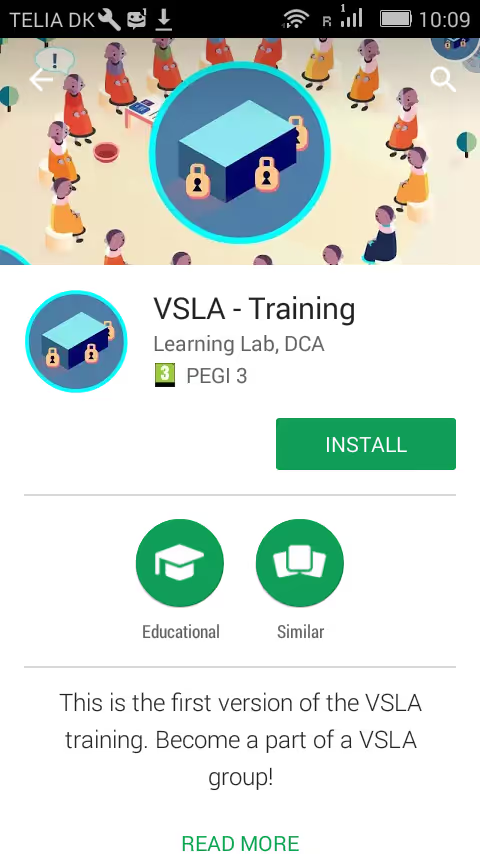

VSLA E-Learning App Phase 2
The overall aim of the Mali Savings for Change Reproductive Health Project is to establish a scalable model for providing affordable and accessible family planning services to savings group members in Mali and beyound.
The project advance an innovative platform and scalable model for delivering family planning services to 420 Savings for Change groups. The greatest finding was that the results could have been greatly improved if men had been involved. This is because the analysis makes it clear that the man's opinion remains the determining factor for women's choice.
The project is seeking to address the need for adolescent girls' and somen's access to access information and services related to family planning and reproductive health.
.avif)

Savings Group Plus Reproductive Health
The primary objective of the project is to result in a PhD thesis analyzing the effects external linkages have on savings and loan associations. A baseline study, randomized control trial, qualitative research and an end-line study will be produced.
The project support field-based costs related to the research, data collection and travel expenses of a PhD study on the effects external financial linkages have on the performance of savings and loan associations at the group and individual member level. Ph.D. project of Kristina Walker Petersen
FAHU provided funding for field-based costs related to the PhD study in the effects financial linkages have on Savings Groups done by Kristina Walker Pedersen.
.avif)

Ph.D. VSLA Linkage Project Phase 1
To develop a self-directed gamifed on-demand e-learning course on the VSLA Methodologybased on the Field Officer Guide developed by VSL Associates. The course is developed as a simulation game where the participants take part in common VSLA activities, such as group constitution, savings meetings and loans meetings. The course is highly interactive and puts a high emphasis on the user experience.
The process of the project can be divided into three main phases:
- Concept and development;
- Production; and
- Testing and post-production.
Distribution of the course is done through the organizations participating in the project reference group, the project partners.
Many INGOs are today seeking to exploit the potential of web-based learning modalities, which could reduce the costs of training to a fraction of the international face-to-face courses currently available. The modern online interactive (dialogue, tests, games) blended learning modalities (videos, simulations, lecture) combined with increasing bandwidth, mobile networks, affordability of technology makes the web-based learning facilities a highly interesting and potential alternative to international NGOs.
